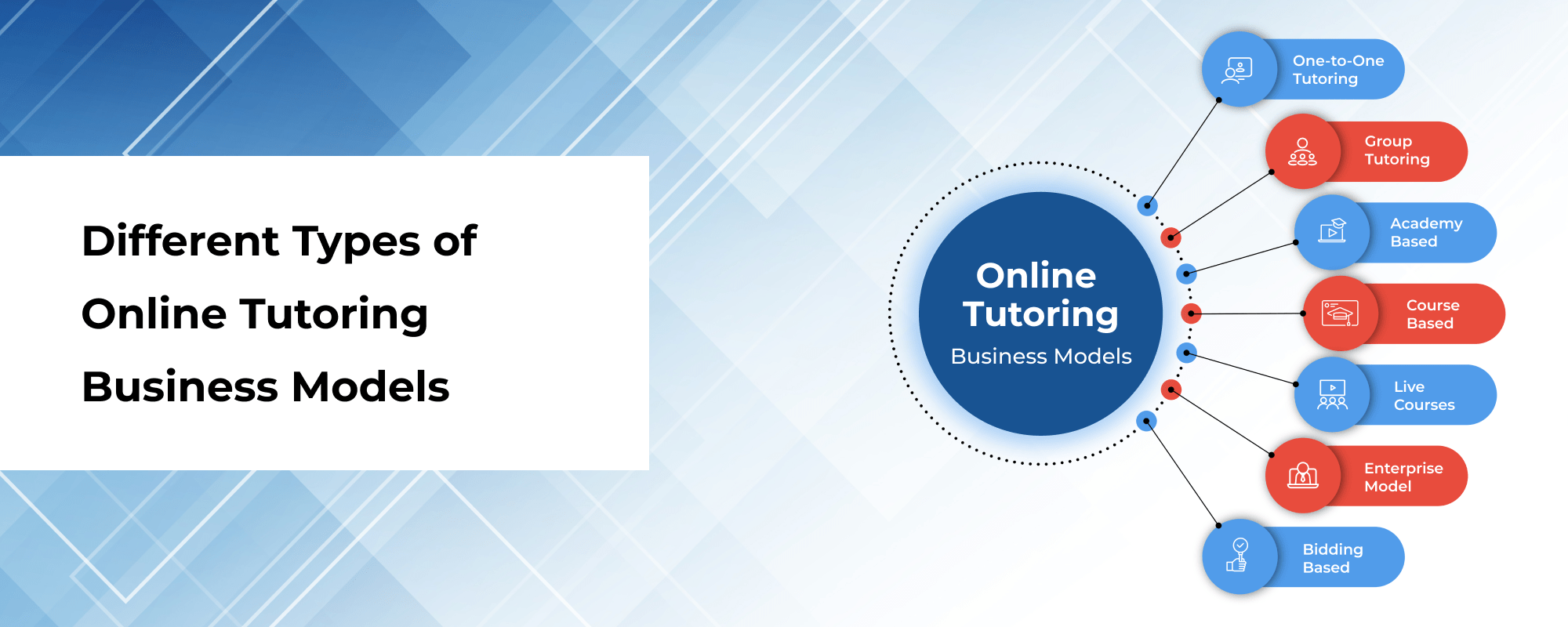According to Grand View Research reports, the global online tutoring services market is expected to grow at a CAGR of 14.9% from 2022 to 2030, reaching $23.73 billion by 2030. This signifies a remarkable surge in the demand for online tutoring services, underscoring the lucrative prospect of establishing an online tutoring business.
However, a successful online tutoring business requires insights into the different types of business models prevailing in the industry. Consequently, it becomes essential to understand them if you are planning to launch your online tutoring platform. In this blog, let us explore the different types of business models for online tutoring businesses, their benefits and challenges, along with key players.
Table of Contents
Types of Online Tutoring Business Models
In order to start a successful online tutoring business, the first crucial step is to determine the right business model. Here, let’s gain in-depth information about some of the popular online tutoring business models.
One-On-One Tutoring Business Model
The one-on-one tutoring business model includes a private tutor that connects with a learner in a personalized learning environment through an online platform. The learners register on a tutoring platform, search for the tutors as per their requirements, and book the tutor by paying a fee. Learners attend one-on-one personalized sessions with tutors via video conferencing tools. The admin charges a certain percentage of the commission fee from tutors after the successful completion of the sessions and releases the revenue of the tutor.
Benefits
- High demand for platforms offering one-on-one tutoring services
- Tutors can easily expand their offline tutoring business and reach a larger audience base
Challenges
- This industry can turn out to be competitive, but with the right strategy and feature-rich software you can get an edge
Key Players
Popular one-on-one online coaching platforms that work on a similar business model are Verbling and Lessonface. While Verbling is an online language learning platform that enables teachers and learners to communicate effortlessly through an online platform, Lessonface connects music enthusiasts with experienced teachers.
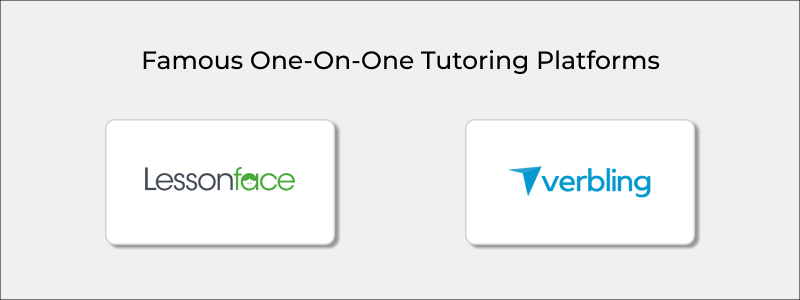
Group Tutoring Business Model
While one-on-one learning is widely preferred in online education, collaborative learning provides its unique advantages. In numerous subjects, interactive learning offers many opportunities for students to engage with their peers.
The group tutoring business model works on the concept that a tutor can teach multiple learners at the same time in a single session. The learners enroll themselves in the group sessions by paying a certain amount of fee. Later, the admin releases the share of the tutor after the successful completion of the session.
Benefits
- Serves more learners at once, eventually increasing revenue
- Facilitates collaboration and interaction among learners
Challenges
- The learners have to attend group sessions as per the availability of the tutors instead of attending classes at their own convenience and time availability.
Key Players
Varsity Tutors and TakeLessons offer personalized and cost-effective online group tutoring to its learners by connecting them with the right tutors.
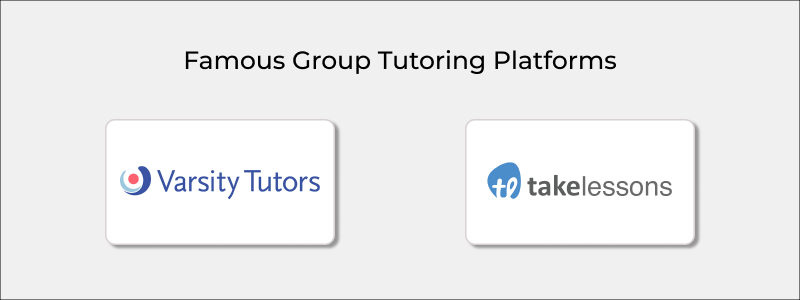
Discuss Your Online Group Tutoring Business Idea with Our Team
Online School/Academy-Based Business Model
In this business model, platform/business owners provide online education services to students who want to enroll in K-12 programs through an online learning platform. A dedicated team of teachers conducts classes online using video conferencing tools and other collaborative features pre-integrated into the system. The platform owner charges the fee from the students based on the sessions and courses purchased. Admin/Platform owner can share a certain percentage of revenue/ fixed salary with the teachers as per the business’ monetization strategy.
Benefits
- One of the plus points of this business model is the recurring revenue opportunity. The students who enroll with the platform will enroll for longer periods and keep coming back to complete their education every year
- In addition to regular tuition fee, additional revenue opportunities such as summer camps, after-school programs and more can also be availed by online schools under this business model
Challenges
- Availing licenses and permits for opening a school requires a lot of planning and information beforehand
Key Players
K12 is a popular online school that offers a variety of personalized learning options for different grades and levels. Another leading player Bridgeway Academy offers personalized accredited K-12 homeschool programs.
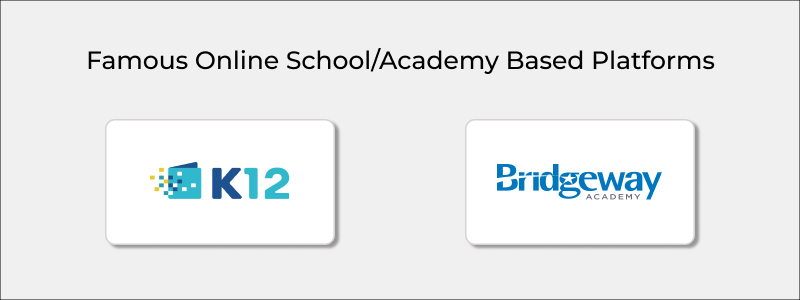
Course-Based Business Model
In the course-based business model, the instructors can create, record, and upload their video lectures in the form of courses on the platform. Learners seeking self-paced learning can purchase these courses from the platform by making an online payment. After the successful payment, the admin earns a commission from the instructors for providing them access to the platform for selling their courses.
Benefits
- The courses are created and uploaded once, enabling recurring sales without much effort from the instructor and the administrator.
- According to research, 53.8% of students chose pre-recorded video courses over live coaching. Hence, there is a huge demand for platforms catering to those seeking self-paced learning.
Challenges
- The platform should leverage the latest technology to enable seamless creation, uploading, and editing of the video courses.
- Limited communication with students, however, a sense of community can be fostered among students by offering discussion forums and more
Key Players
Popular course-based online tutoring platforms include Udemy and Masterclass. Both of these platforms offer courses to learners that are created by instructors and are available in the form of pre-recorded videos.
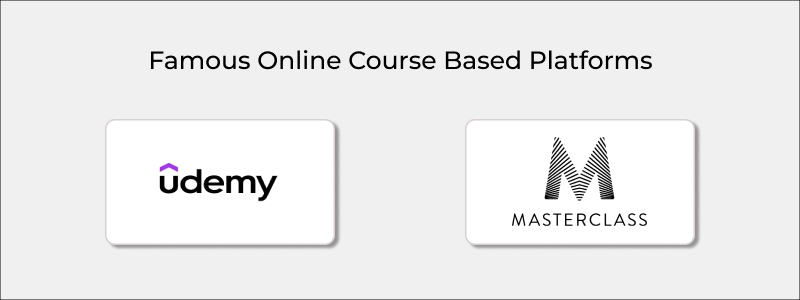
Planning to Launch a Feature-rich Course-Based Marketplace?
Live Course Business Model
Learners want to build their knowledge and skills step-by-step through continuous sessions for a long time. To cater to this burgeoning demand, the live course business model came into the picture. A platform based on this business model enables learners to enroll themselves in a bundle of classes by paying just once. The sessions are conducted live, offering real-time interaction with tutors. The tutors conduct sessions and get paid by the admin after the completion of the sessions.
Benefits
- Growing demand for live courses among students, and professionals
- Live courses when bundled together, potentially increase the revenue compared to individual sessions
- Cost-effective and convenient option for learners as instead of booking each class individually they can simply purchase the bundle with a single transaction
Challenges
- Requires a robust infrastructure for hosting live courses
- Determining the right pricing strategy and revenue may be a bit challenging in the starting
Key Players
SkillShare is one of the popular online learning platforms that offers live courses in bundles on their platform.

Enterprise Business Model
This business model involves catering to businesses and organizations looking to upskill and train their employees. The enterprises buy a training plan or pay a subscription fee to access the platform and services offered by it. The organizations/enterprises then give its employees access to the platform for attending training sessions. The admin earns revenue by deducting its commissions from the enterprise package fee and pays instructors their share of revenue after the successful completion of sessions.
Benefits
- Offering training as a benefit enhances employee engagement and job satisfaction so this business model is a hit among businesses of all sizes.
- Platforms based on this business model offer features that help in real-time progress tracking, identifying skill gaps through data analytics and reporting tools.
Challenges
- Frequent cases of data security breaches worldwide make it very crucial for enterprises to be vigilant about their employee’s data and information
Key Players
Udemy Business and Coursera For Business are some of the popular online enterprise training platforms that help organizations deliver interactive employee training sessions enabling targeted training.
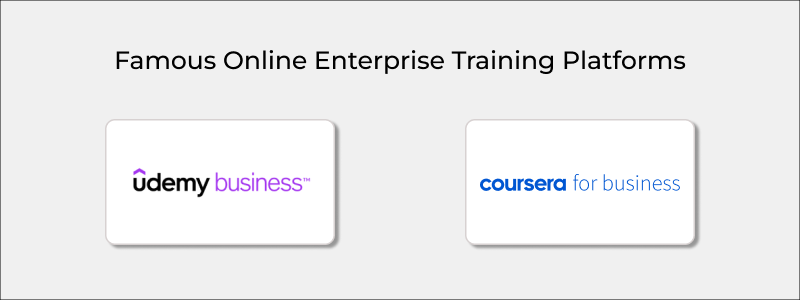
Proposal/Bidding-Based Business Model
This business model is based on the approach where learners are connected with experienced and knowledgeable tutors capable of addressing their academic queries. On an online platform, the learners post their questions and verified tutors submit their bids/proposals to assist and resolve their queries. After reviewing their price, reviews, and other details learners can select and hire a tutor. Later, the administrator releases the payment of the tutor after the students successfully get the solution/answer by the respective tutor.
Benefits
- The growing user base for such services
- Advantages for students include that they can compare the tutor’s reviews, prices, and profiles before making a selection.
Challenges
- This business model is based on a highly unpredictable setup and is hugely dependent on the number of bids/proposals which is not guaranteed
Key Players
Prominent players based on this business model are Studypool and SolutionInn. These platforms effectively connect students with academic questions with expert tutors who can answer them.

Get a Proven Software Solution to Launch Your Online Tutoring Platform
Certificate-Based Business Model
Platforms operating on a certificate-based business model enable learners to enroll in courses that offer certification after the completion of the courses. This business model is based on charging either a monthly, or one-time fee from users for enrolling in these courses.
The platform owner can also collaborate with reputed universities, organizations, and institutions, enabling them to offer specialized courses to learners through the platform. In this business model, both platform owner and universities will share the earned revenue as per the business’ monetization strategy.
Benefits
- Massive demand for certificate-based courses among learners
- Offering certificate-based online learning courses can set your business apart in the competitive landscape
Challenges
- As this business model is very popular, handling growth on the platform may become challenging. Therefore, the platform should be highly scalable to accommodate and manage the increased number of users and the certificates to be issued
- The platform should have a favorable reputation in the industry to ensure that obtaining certification from the platform holds significant value for the learners.
Key Players
A prominent player offering certification courses in the online tutoring industry is Coursera. By enrolling on Coursera learners gain free access to courses and can get certificates by paying a certain amount. Udacity is another similar certification-based platform that offers industry-specific certificate courses.
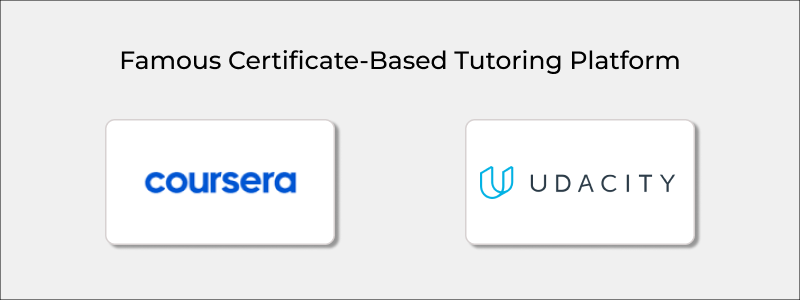
Online Booking With Offline Classes Business Model
In the ever-evolving landscape of education, the fusion of online convenience with the tangible benefits of offline interaction has given rise to a unique and dynamic business model i.e. online booking with offline classes. This innovative business model bridges the gap between those seeking flexibility in online booking of sessions that they would attend in-person at a physical location.
In this business model, the learners book their sessions online by paying a certain amount of fee through an online platform. The tutors conduct these sessions offline in the classroom and can record the sessions through the online platform. After successful completion of the offline session, the administrator charges the commission fee from the tutor.
Benefits
- This business model can help you set up a hyperlocal online tutoring marketplace through which you can cater to different localities in your city or country
- Students can get recordings of their offline classes which is beneficial for the students for their future reference.
Challenges
- With so many bookings, it may become challenging to manage the time slots for a large number of learners. Coordinating and managing schedules is also a complex task. However, with an efficient booking system and functionalities like calendar availability, these scheduling complexities can be streamlined.
Key Players
TUTEEMIplus is a renowned online learning platform offering online booking of sessions that are conducted offline at the client’s preferred location.

Subscription-Based Business Model
In the subscription-based business model, the learners enroll in the courses or sessions on the platform by paying a monthly or yearly subscription fee. The administrator of the platform designs the subscription packages according to the business’ monetization strategy. Later, the tutors get their share of the revenue as decided by the platform owner.
Benefits
- A consistent source of monthly/yearly recurring revenue
- Business owners can create multiple pricing tiers, catering to different learner segments
Challenges
- To retain subscribers, the platform must offer the latest features and functionality to get an edge over competitors.
Key Players
Coursera Plus works on a subscription business model and provides access to courses from prestigious universities and colleges worldwide. LinkedIn Learning also operates on a subscription-based business model, providing users access to a huge variety of courses.

B2B Business Model
In the business-to-business (B2B) business model, various businesses, organizations, and institutes connect with learners through an online learning platform. The organizations and institutions register themselves on the platform to offer tutoring services to their students in a private setup. The administrators provide them a platform to connect with learners in return for a commission fee or subscription charges.
Benefits of B2B Business Model
- These online learning platforms can cater to the needs of an entire organization, resulting in increased revenue for all the stakeholders (Admin, Enterprises, Organizations, and Learners)
Challenges of B2B Business Model
- Enterprises and organizations may face integration challenges as it may be a little complex to integrate existing enterprise systems and may require customizations.
- Businesses tend to have sensitive data that need to be protected, hence the platform must comply with industry regulations and standards.
Key Players
One of the popular platforms that works on the B2B business model is EdX Enterprise which empowers organizations and learners’ ambitions.

Launch a Successful Online Tutoring Platform
Conclusion
The online tutoring industry is growing rapidly. Hence, launching an online tutoring business can prove to be profitable. If you are an entrepreneur who is looking to start your own online tutoring business, then we hope that through this post you must have gained an in-depth knowledge related to all business models prevalent in the online tutoring industry. That being said, our turnkey solution- Yo!Coach can help you in launching your online tutoring platform quickly.
It encapsulates advanced features and functionality and is pre-designed to cater to the needs of all users – tutors, learners, and the admin. Some of the advanced features offered by Yo!Coach includes location-based time scheduling, rating and reviewing teachers and courses, video chat, gift cards, and more. For more information, get in touch.
